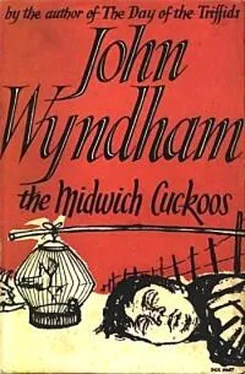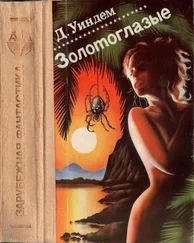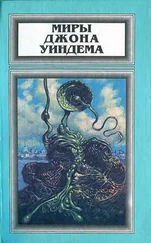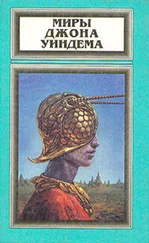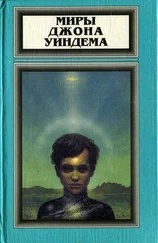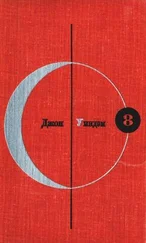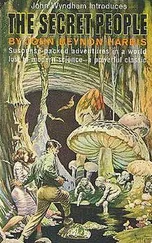Джон Уиндем - Consider Her Ways
Здесь есть возможность читать онлайн «Джон Уиндем - Consider Her Ways» весь текст электронной книги совершенно бесплатно (целиком полную версию без сокращений). В некоторых случаях можно слушать аудио, скачать через торрент в формате fb2 и присутствует краткое содержание. Жанр: Фантастика и фэнтези, на английском языке. Описание произведения, (предисловие) а так же отзывы посетителей доступны на портале библиотеки ЛибКат.
- Название:Consider Her Ways
- Автор:
- Жанр:
- Год:неизвестен
- ISBN:нет данных
- Рейтинг книги:5 / 5. Голосов: 1
-
Избранное:Добавить в избранное
- Отзывы:
-
Ваша оценка:
- 100
- 1
- 2
- 3
- 4
- 5
Consider Her Ways: краткое содержание, описание и аннотация
Предлагаем к чтению аннотацию, описание, краткое содержание или предисловие (зависит от того, что написал сам автор книги «Consider Her Ways»). Если вы не нашли необходимую информацию о книге — напишите в комментариях, мы постараемся отыскать её.
Consider Her Ways — читать онлайн бесплатно полную книгу (весь текст) целиком
Ниже представлен текст книги, разбитый по страницам. Система сохранения места последней прочитанной страницы, позволяет с удобством читать онлайн бесплатно книгу «Consider Her Ways», без необходимости каждый раз заново искать на чём Вы остановились. Поставьте закладку, и сможете в любой момент перейти на страницу, на которой закончили чтение.
Интервал:
Закладка:
"But most of these things had already gone," I protested. "The world was getting better."
"Was it?" she said. "I wonder if the women of Berlin thought so when it fell? Was it, indeed? Or was it on the edge of a new barbarism?"
"But if you can only get rid of evil by throwing out the good too, what is there left?"
"There is a great deal. Man was only a means to an end. We needed him in order to have babies. The rest of his vitality accounted for all the misery in the world. We are a great deal better off without him."
"So you really consider that you've improved on nature?" I suggested.
"Tcha!" she said, impatient with my tone. "Civilization is improvement on nature. Would you want to live in a cave, and have most of your babies die in infancy?"
"There are some things, some fundamental things — " I began, but she checked me, holding up her hand for silence.
Outside, the long shadows had crept across the lawns. In the evening quiet I could hear a choir of women's voices singing, a little distance away. We listened for some minutes until the song was finished.
"Beautiful!" said the old lady. "Could angels themselves sing more sweetly! They sound happy enough, don't they? Our own lovely children — two of my granddaughters are there among them. They are happy, and they've reason to be happy; they're not growing up into a world where they must gamble on the goodwill of some man to keep them; they'll never need to be servile before a lord and master; they'll never stand in danger of rape and butchery, either. Listen to them!"
Another song had started and came lilting lightly to us out of the dusk.
"Why are you crying?" the old lady asked me as it ended.
"I know it's stupid — I don't really believe any of this is what it seems to be — so I suppose I'm crying for all you would have lost if it were true," I told her. "There should be lovers out there under the trees; they should be listening hand in hand to that song while they watch the moon rise. But there are no lovers now, there won't be any more — ." I looked back at her.
"Did you ever read the lines: 'Full many a flower is born to blush unseen, and waste its sweetness on the desert air'? Can't you feel the forlornness of this world you've made? Do you really not understand?" I asked.
"I know you've only seen a little of us, but do you not begin to understand what it can be like when women are no longer forced to fight one another for the favors of men?" she countered.
We talked on while the dusk gave way to darkness and the lights of other houses started to twinkle through the trees. Her reading had been wide. It had given her even an affection for some periods of the past, but her approval of her own era was unshaken. She felt no aridity in it. Always it was my "conditioning" which prevented me from seeing that the golden age of woman had begun at last.
"You cling to too many myths," she told me. "You speak of a full life, and your instance is some unfortunate woman hugging her chains in a suburban villa. Full life, fiddlesticks! But it was convenient for the traders that she could be made to think so. A truly full life would be an exceedingly short one, in any form of society."
And so on —
At length, the little parlor maid reappeared to say that my attendants were ready to leave when it should be convenient. But there was one thing I very much wanted to know before I left. I put the question to the old lady.
"Please tell me. How did it — how could it — happen?"
"Simply by accident, my dear — though it was the kind of accident that was entirely the product of its time. A piece of research which showed unexpected, secondary results, that's all."
"But how?"
"Rather curiously — almost irrelevantly, you might say. Did you ever hear of a man called Perrigan?"
"Perrigan?" I repeated. "I don't think so, it's an uncommon name."
"It became very commonly know indeed," she assured me. "Doctor Perrigan was a biologist, and his concern was the extermination of rats — particularly the brown rat, which used to do a great deal of expensive damage.
"His approach to the problem was to find a disease which would attack them fatally. In order to produce it he took as his basis a virus infection often fatal to rabbits — or, rather, a group of virus infections that were highly selective, and also unstable since they were highly liable to mutation. Indeed, there was so much variation in the strains that when infection of rabbits in Australia was tried, it was only at the sixth attempt that it was successful; all the earlier strains died out as the rabbits developed immunity. It was tried in other places, too, though with indifferent success until a still more effective strain was started in France, and ran through the rabbit population of Europe.
"Well, taking some of these viruses as a basis, Perrigan induced new mutations by irradiation and other means, and succeeded in producing a variant that would attack rats. That was not enough, however, and he continued his work until he had a strain that had enough of its ancestral selectivity to attack only the brown rat, and with great virulence.
"In that way he settled the question of a long-standing pest, for there are no brown rats now. But something went amiss. It is still an open question whether the successful virus mutated again, or whether one of his earlier experimental viruses was accidentally liberated by escaped 'carrier' rats, but that's academic. The important thing is that somehow a strain capable of attacking human beings got loose, and that it was already widely disseminated before it was traced — also, that once it was free, it spread with devastating speed; too fast for any effective steps to be taken to check it.
"The majority of women were found to be immune; and of the ten percent or so whom it attacked over eighty percent recovered. Among men, however, there was almost no immunity, and the few recoveries were only partial. A few men were preserved by the most elaborate precautions but they could not be kept confined forever, and in the end the virus, which had a remarkable capacity for dormancy, got them too."
Inevitably several questions of professional interest occurred to me, but for an answer she shook her head.
"I'm afraid I can't help you there. Possibly the medical people will be willing to explain," she said, but her expression was doubtful.
I manoeuvred myself into a sitting position on the side of the couch.
"I see," I said. "Just an accident — yes, I suppose one could scarcely think of it happening in any other way."
"Unless," she remarked, "unless one were to look upon it as divine intervention."
"Isn't that a little impious?"
"I was thinking of the Death of the Firstborn," she said reflectively.
There did not seem to be an immediate answer to that. Instead, I asked:
"Can you honestly tell me that you never have the feeling that you are living in a dreary kind of nightmare?"
"Never," she said. "There was a nightmare — but it's over now. Listen!"
The voices of the choir, reinforced now by an orchestra, reached us distantly out of the darkened garden. No, they were not dreary: they even sounded almost exultant — but then, poor things, how where they to understand — ?"
My attendants arrived and helped me to my feet. I thanked the old lady for her patience with me and her kindness. But she shook her head.
"My dear, it is I who am indebted to you. In a short time I have learnt more about the conditioning of women in a mixed society than all my books were able to tell me in the rest of my long life. I hope, my dear, that the doctors will find some way of enabling you to forget it, and live happily here with us."
At the door I paused and turned, still helpfully shored up by my attendants.
Читать дальшеИнтервал:
Закладка:
Похожие книги на «Consider Her Ways»
Представляем Вашему вниманию похожие книги на «Consider Her Ways» списком для выбора. Мы отобрали схожую по названию и смыслу литературу в надежде предоставить читателям больше вариантов отыскать новые, интересные, ещё непрочитанные произведения.
Обсуждение, отзывы о книге «Consider Her Ways» и просто собственные мнения читателей. Оставьте ваши комментарии, напишите, что Вы думаете о произведении, его смысле или главных героях. Укажите что конкретно понравилось, а что нет, и почему Вы так считаете.
